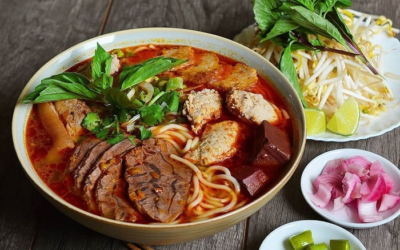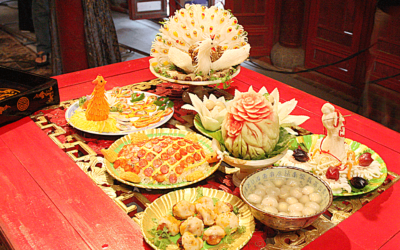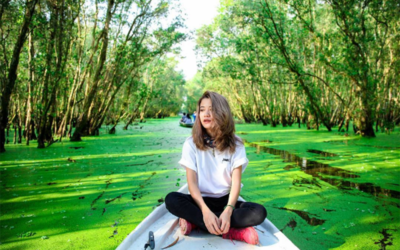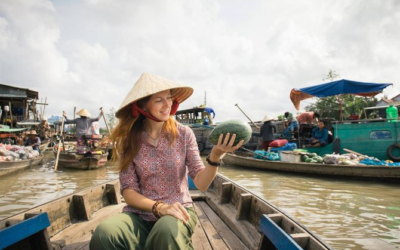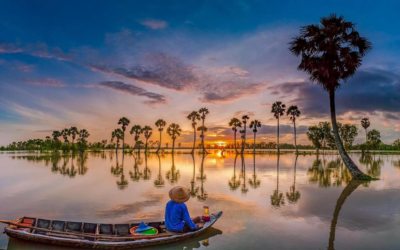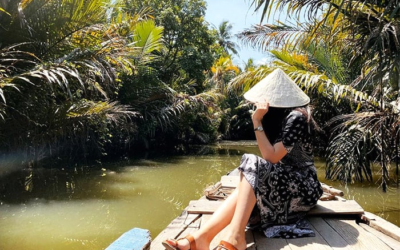Mausoleums, historical relics, temples, etc., have long been famous tourist attractions in Hue, but that alone is not enough. Hue also has a list of “must check-in” places that few people think of. From famous landscapes to historical relics, we promise that you will discover “all” the beauty of the ancient capital with these 20+ Hue tourist attractions!
1/ Attractions in Hue – Complex of Nguyen Dynasty royal tombs
The complex of Nguyen Dynasty mausoleums is one of the most famous Hue tourist destinations. You need to check in as soon as you set foot on this land because these mausoleums are not only a famous landmark but also a mark of cultural history and pride for the people of Hue. Most of the mausoleums are located southwest of Hue.
Gia Long Tomb (Huong Tho commune, Huong Tra town)
Also known as Thien Thu Lang, it was built from 1814 to 1820 under the direct direction and supervision of King Gia Long. The mausoleum is located on a flat hill surrounded by 34 mountains. This is a beautiful picture of the coordination between nature and architecture, expressing the grandeur and nobility of the head king of the Nguyen Dynasty.
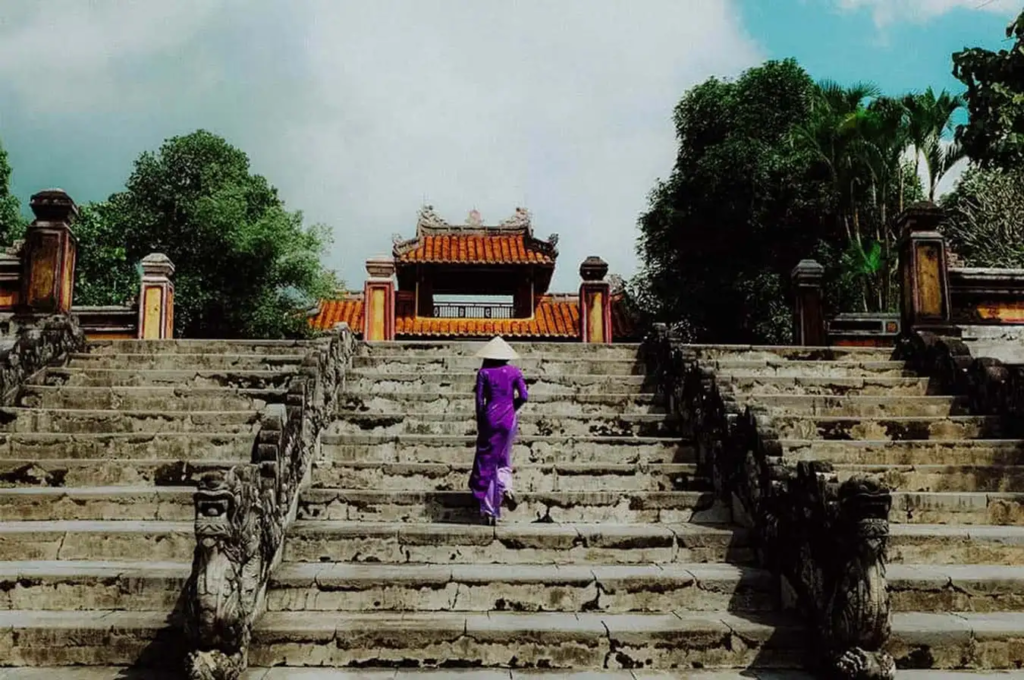
Minh Mang Tomb (Huong Tho commune, Huong Tra town)
Also known as Hieu Lang, it is located on Cam Ke Mountain, about 15 km from Hue city center. Minh Mang Tomb is a collection of unique architectural works with more than 40 buildings, including palaces, castles, and pavilions. Besides, the mausoleum is also a treasure with nearly 600 crosswords carved with poems on Bi Dinh, Hien Duc Mon, Sung N Palace, and Minh Lau. Tomb Minh Mang demonstrates the seriousness and integrity of a social institution that resembles a king with strategic talent in many fields.

Tomb of Tu Duc (Thuy Xuan ward, Hue City)
Also known as Khiem Lang, it is one of the most beautiful architectural works of the Nguyen Dynasty, about 5 km from Hue’s city center. Tu Duc Tomb has about 50 architectural works with the word Khiem in the name. There is also Minh Khiem theater here for the king to watch, considered the oldest theater in Vietnam still preserved.

Khai Dinh Tomb (Thuy Bang commune, Huong Thuy town)
This is the result of the integration of many Asian and European architectural lines. The mausoleum is the pinnacle of the art of creating porcelain and glass. Khai Dinh Tomb is also one of the Hue tourist destinations that is very popular with tourists because of its delicate texture and structure and high artistic value.

In addition, if you have time, you can still visit many tombs of other Nguyen kings in Hue, such as Thieu Tri tomb, Duc Duc tomb, and Dong Khanh tomb…
2/ Attractions in Hue – Hue Citadel
The Citadel is a popular name for a cluster of buildings, including the Imperial Citadel and the Forbidden City, built-in 1804. It has more than 140 large and small projects serving the central government apparatus, with a gate system. The Citadel is equally massive. The entire Imperial Citadel is spread out over a nearly square area of land, with each side measuring up to 2,500 m. Some “must check-in” buildings and places when you visit the Citadel:
Ngo Mon (main southern gate of the Imperial Citadel)
Built in 1833 during the reign of King Minh Mang, it was the place where essential ceremonies of the Nguyen Dynasty took place. Ngo Mon Gate is both majestic and majestic and rich in the moss of time.

Thai Hoa palace
This is the most essential construction in the Imperial Citadel area. Built-in 1805, Thai Hoa Palace was the place where the grand ceremonies of 13 kings from Gia Long to Bao Dai took place. Thai Hoa Palace has a large adoration yard in front. Inside, it is decorated with a throne used as the king’s residence during adoration and ceremonies. With a large area and containing many cultural values and beautiful architecture, Thai Hoa Palace is a place you should not miss when visiting the Citadel.

Temples
Thai Mieu (temple worshiping the Nguyen lords, built-in 1802), Hung Mieu (temple honoring Mr. Nguyen Phuc Luan, father of King Gia Long), The Mieu (temple worshiping the Nguyen lords, built-in 1821), Trieu Mieu (temple honoring Nguyen Kim, father of Lord Nguyen Hoang).
Co Ha Garden and Kham Van Palace
It is one of five royal gardens located inside the Imperial Citadel, a place for the Prince to study and play, with a large area and a harmonious and beautiful layout.

Some other places in the Citadel you should visit are Nine Dinh, Forbidden City, Duyet Thi Duong Theater, Thai Binh Lau, Dien Tho Palace, Tu Phuong Vo Su Pavilion, etc. Since 1993, the Ancient Capital Relics Complex Hue has been recognized as a World Cultural Heritage by UNESCO.
3/ Hue Quoc Hoc School
The school was built on the foundation of the Water Master’s Palace (a place for training waterway soldiers of the Nguyen Dynasty army) on the southern bank of the Perfume River. At first, the school was just a row of thatched houses. By 1914, the thatched cottages were replaced by two rows of brick-roofed, solidly tiled houses in the Western European style. And this architecture has been maintained to this day.


This is a super favorite Hue tourist destination for those who like the ancient but unique style, with red-colored photos typical of Hue’s National Academy.
4/ Attractions in Hue – Dong Ba Market
Similar to Ben Thanh market in Saigon and Dam market in Nha Trang, Dong Ba market is also a symbol of Hue and one of the famous Hue tourist destinations. This market opened during the reign of King Gia Long. After many events, it was renamed Dong Ba Market in 1887 by King Dong Khanh.
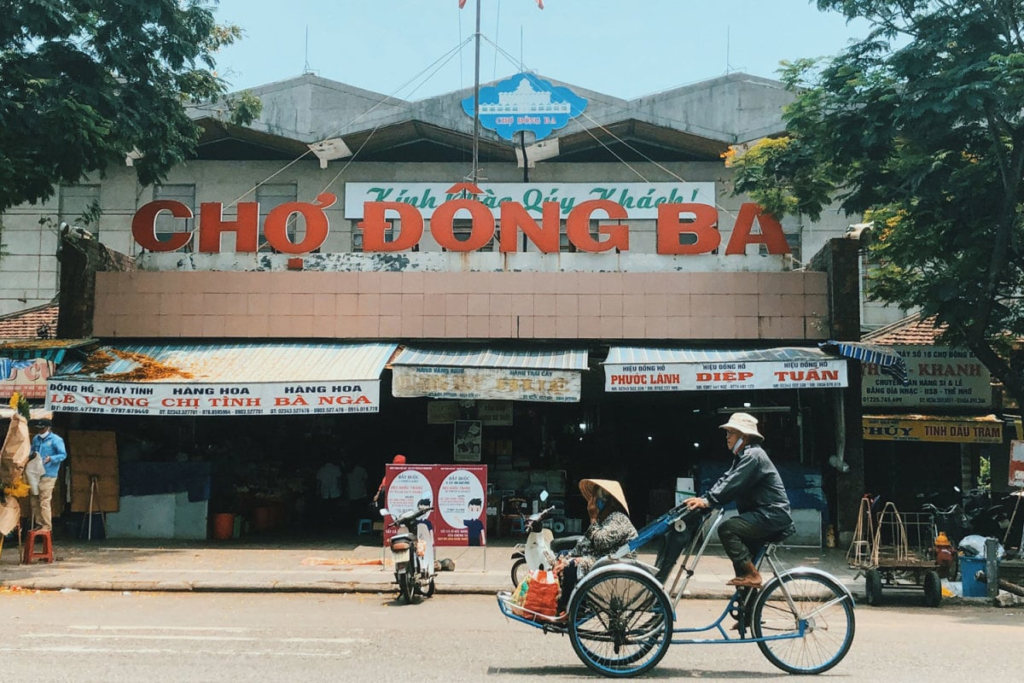
5/ Tu Dam Pagoda
Located at No. 1 Su Lieu Quan, Hue City, Tu Dam Pagoda was initially called An Ton and was founded by Minh Hoang Tu Dung in 1695. The pagoda’s importance in the revival and development of Vietnamese Buddhism in modern times is also a famous destination when mentioning Hue tourist attractions.

6/ Thien Mu Pagoda
It is impossible to “turn a blind eye” to this scenic spot when talking about Hue tourism – Thien Mu Pagoda. Thien Mu Pagoda, also known as Linh Mu Pagoda, is located on Ha Khe Hill on the left bank of the Perfume River, Kim Long Ward, Hue City (about 5 km west of the center).

This is the earliest pagoda established in Hue (around 1601). When talking about the image of Thien Mu Pagoda, people often immediately remember Phuoc Duyen Tower, formerly Tu Nhan Thap, was built in 1844 by King Thieu Tri. The tower is 21 m high with an octagonal shape and has seven floors. Each floor of Phuoc Duyen Tower worships a different Buddha. In front of the building is Huong Nguyen’s communal house.

Thien Mu Pagoda is also a symbol with the gentle beauty of the ancient capital of Hue. It becomes a must-visit Hue tourist destination for any tourist visiting this sacred but also romantic place. If you visit Hue and have never seen Thien Mu Pagoda, you have not really been to Hue.
7/ Attractions in Hue – Phu Cam hat village
The image of the conical hat has been associated with the ancient capital for hundreds of years. It has become a cultural specialty “poem hat” related to the image of a Hue girl in a flowing ao dai. Therefore, you should visit Phu Cam hat village, Phuoc Vinh ward, to see firsthand the skillful hands of women and girls making these Hue-style hats.

==> Read more: Festival in Hue – Discover unique events in the ancient capital
8/ Nam Giao Dan
Located on Dien Bien Phu Street in the city center, the Nam Giao Forum is a Hue tourist destination that will be a highlight for your entire “trip” to Hue because this is also one of the marks and symbols of Hue. Famous historical statues of this land. Nam Giao altar is where the Nguyen kings offered sacrifices to heaven. It was built in 1806 under the reign of King Gia Long.

Nam Giao altar has 3 floors, built on top of each other, symbolizing heaven, earth, and humanity. The upper layer represents heaven, the middle layer represents earth, and the bottom layer represents humans.

9/ Hai Van Quan
This gate, which has witnessed many historical ups and downs, is a famous Hue tourist destination located in Lang Co town, Phu Loc district. Situated on top of Hai Van Pass, one of the most dangerous passes in Vietnam with an altitude of 490 m above sea level, Hai Van Quan was built in 1826 under the reign of King Minh Mang.
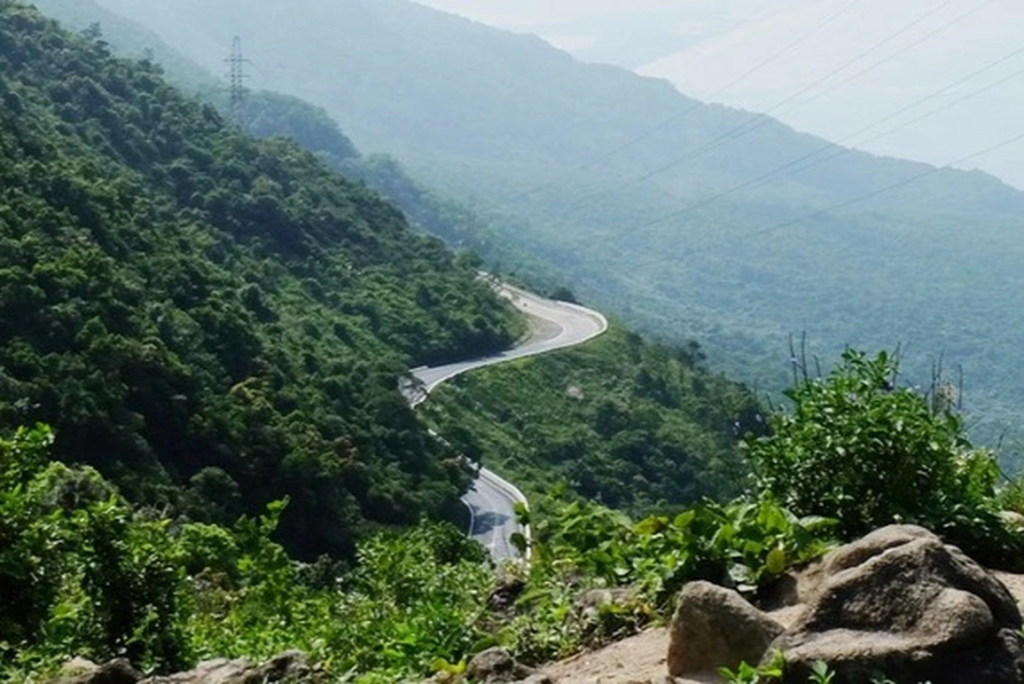

Today, Hai Van Quan is such a famous landscape and a place that can not miss when traveling to Hue. Standing on Hai Van Quan, you can see the panoramic view of the winding Hai Van Pass along the mountainside – a perfect wide angle, especially for those who are “passionate about landscapes” or like check-in points.
10/ Attractions in Hue – Garden house
The next Hue tourist destination for those who would like to check in is the garden houses.
An Hien Garden House (No. 58 Nguyen Phuc Nguyen Street, Hue City)
It is a typical garden house with unique architecture and a beautiful landscape. In the middle of the garden is a three-room, two-wing home with extremely exemplary design, carvings, and interior decoration.
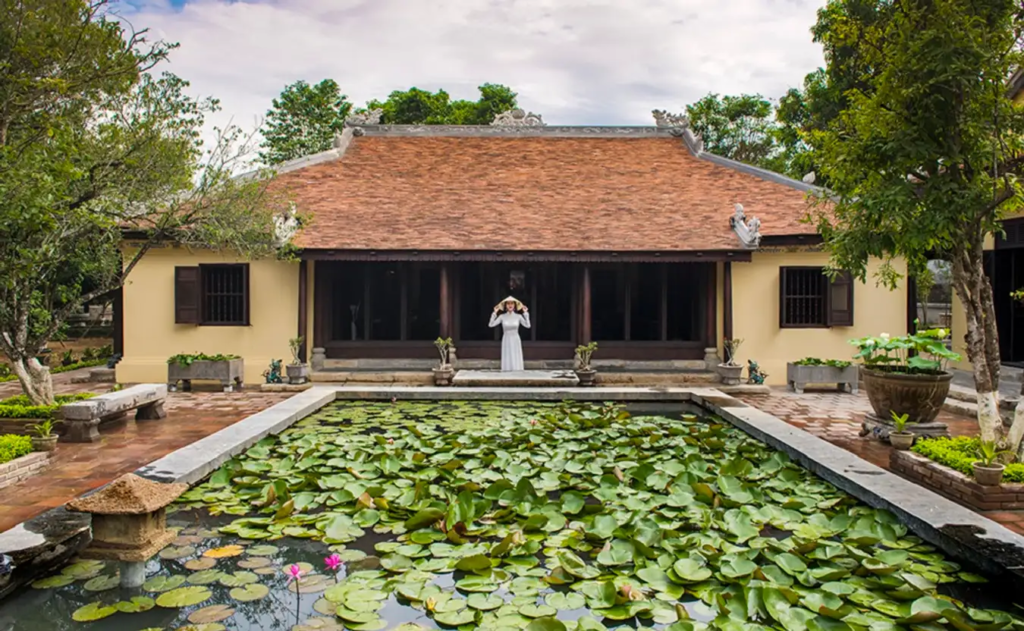
Phu Mong Garden House (Kim Long Ward, Hue City)
It is a garden house complex in the Phu Mong – Kim Long area today. From the center, follow the north bank of the Perfume River about 2 km upstream; you will reach the place that used to be the palace of the kings and queens of Dang Trong.
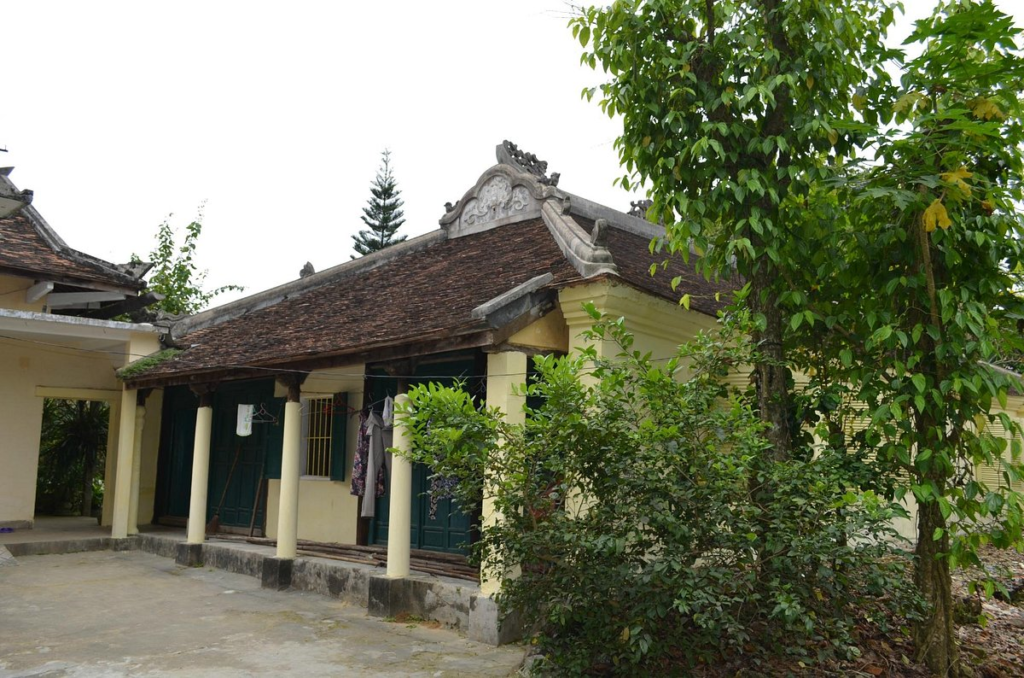
Thuy Bieu Garden
Coming here, you will see with your own eyes the vast gardens of Thanh Tra – Hue’s specialty fruit and immerse yourself in the sweet, gentle, and unforgettable flavor of this fruit. Furthermore, surrounding Thuy Bieu is a system of famous landscapes and buildings, especially a system of pillar houses over 100 years old.
11/ Attractions in Hue – Hue beaches
Coastal beaches are a specialty of the Central region, and when traveling to Hue, remember to visit the beautiful, fairy-like beaches of this land. The beaches on the list of Hue tourist attractions that Yourvietnam.org wants to introduce to you include:
Canh Duong Beach (Loc Vinh commune, Phu Loc district)
About 65 km from Hue city center with an arc-shaped beach, gentle slope, fine white sand, and clear blue seawater. Coming here, you will feel the wild beauty, welcome the golden sunlight, and enjoy posing. Because the beach is such a fairyland of the Central region!

Lang Co beach
As one of the most beautiful bays in the world, voted in 2009, about 75 km from Hue city center, at the foot of Hai Van pass, Lang Co Beach obviously appears on the list of must-check-in Hue tourist destinations.

Lang Co beach contains almost everything that nature can bestow: the blue color of the sea mixed with tropical forests, long white sand beaches, and golden sunlight covering the landscape, bringing a feeling of peace.
Thuan An Beach (Thuan An town, Phu Vang district)
About 15 km from Hue city center, this is a tourist attraction and a resort paradise for many people. Thuan An Beach is a familiar address for tourists. Suppose you choose to stay here for a few days. In that case, you can also spend time enjoying the taste of Chuon village’s sticky rice wine, fresh seafood dishes (blood cockles, shrimp, grilled beach squid), and local dishes.

12/ Vong Canh Hill
In the Hue travel guide “guide,” if you want to see the incredible natural panorama of Hue, where should you go? Indeed, the answer will be Vong Canh Hill, located in Thuy Xuan ward, southwest of Hue City. The foothill is adjacent to the banks of the Perfume River, situated between the mausoleums of the Nguyen Dynasty kings and opposite Hon Chen Palace across the Perfume River.
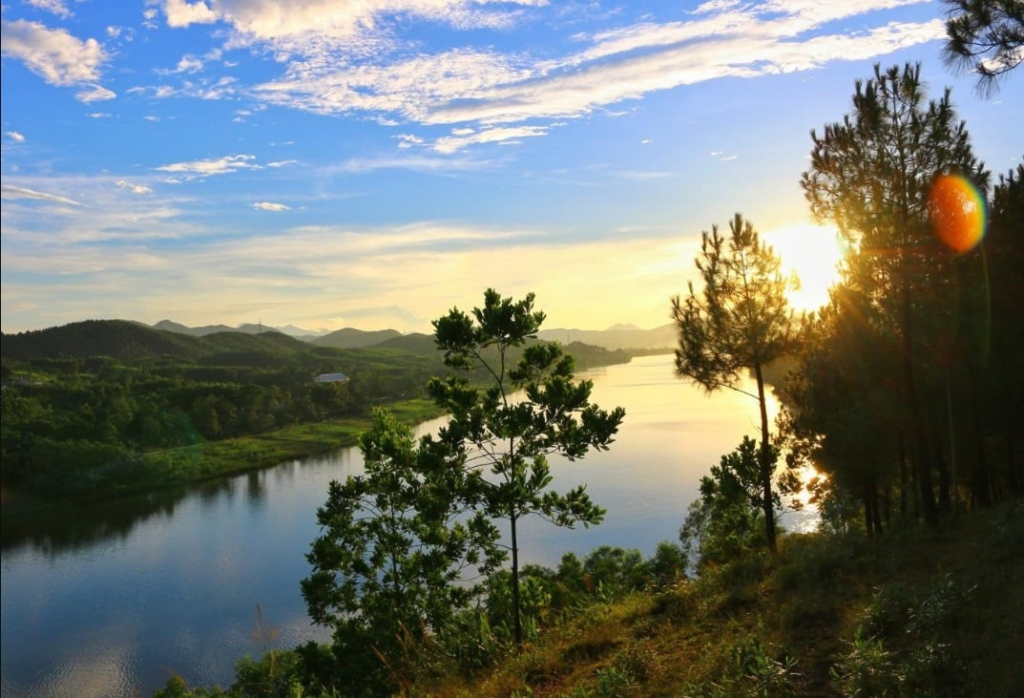
13/ Attractions in Hue – Dam Chuon
Dam Chuon (Phu An commune, Phu Vang district) is also a famous Hue tourist destination in the “virtual living” world; it is part of the Tam Giang lagoon system. Only about 10 km from Hue city, to get here, you need to go through Highway 49 and turn toward An Truyen. Coming here, you can enjoy a vast lagoon, watch the beautiful sunset over the lagoon, and enjoy the food. And, of course, take some “so deep” photos to share about your wonderful trip to Hue!

14/ Attractions in Hue – Tam Giang Lagoon
In most Hue travel guides, Tam Giang Lagoon is always an indispensable place. With a length of 25 km, Tam Giang Lagoon stretches from the O Lau River mouth to Thuan An Bridge, connecting with Thuy Tu Lagoon and Cau Hai Lagoon.

From February to July is the ideal time to experience the life of fishermen here:
- Go fishing together.
- Enjoy dishes made from fresh seafood.
- Immerse yourself in the colors.
15/ Attractions in Hue – Pe Ker Pass
When mentioning Hue, many people immediately remember Hai Van Pass but sometimes forget Pe Ker Pass. It is an unknown place in Hue for those who like to explore and see the panorama from above. Pe Ker Pass has a slope of 10% and is more than 800 m long. From A Nor waterfall, you go north about 10 km to immerse yourself in the poetic and beautiful scenery of Pe Ker Pass.
Pe Ker Pass also brings a little “thrills” for those who love adventure and self-discovery through the passes.
16/ Attractions in Hue – Ru Cha mangrove forest
Ru Cha is an ancient mangrove forest being restored and developed with an area of nearly 5 hectares in Huong Phong commune, Huong Tra town. From Thuan An port, you can visit this place by boat or fishing boat.

Ru Cha is one of the pristine places in Hue, the only remaining ancient forest in the Tam Giang lagoon. Following the paths deep inside Ru Chá, you will see a boat made of concrete – that is, the temple worshiping the sea god, where fishermen come to pray for peace before each trip to the sea.
17/ Attractions in Hue – Truong Tien Bridge
The last attractions that Yourvietnam.org wants to introduce to you today is the famous Truong Tien Bridge. Truong Tien Bridge is a bridge across the Perfume River, designed and completed by the French in 1889. The famous saying “Truong Tien bridge has six spans and twelve spans” is an accurate description of its length. Of this bridge (420.6 m).
After many name changes and bombardments that caused the bridge to lose its original number of spans, Truong Tien is still a bridge that has witnessed a gentle history across the Perfume River and welcomes many tourists every day.



